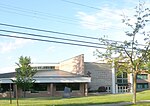Chatham Borough is a borough in Morris County, in the U.S. state of New Jersey. As of the 2020 United States census, the borough's population was 9,212, an increase of 250 (+2.8%) from the 2010 census count of 8,962, which in turn reflected an increase of 502 (+5.9%) from the 8,460 counted in the 2000 census.The area that is now Chatham has been inhabited by humans for thousands of years. During historic times, Europeans began trading with the Native Americans who farmed, fished, and hunted in the area when it was claimed as part of New Netherlands. The community that now is Chatham was first settled by Europeans in 1710 within Morris Township, in what was then the English Province of New Jersey. The community was settled because the site already was on the path of a well-worn Native American trail, the location of an important crossing of the Passaic River, and being close to a gap in the Watchung Mountains. The residents of the English community changed its name from John Day's Bridge to Chatham, New Jersey in 1773.Chatham's residents were active participants in the American Revolutionary War, which ended in 1783. Chatham Township was formed as a local government in the new state of New Jersey on February 12, 1806, taking its name from this pre-revolutionary village. Initial local government forms were limited while the new state government evolved. The new township governed the village of Chatham that lay within the present-day borough boundaries, along with several other pre-revolutionary, colonial villages and large areas of unsettled lands connecting or adjacent to them. On August 19, 1892, Chatham adopted a new village form of government when it became allowed within townships in the state after the revolution. Shortly thereafter, once it was allowed, the village of Chatham reincorporated for governance as a borough by an act of the New Jersey Legislature on March 1, 1897, returning to complete independence from the surrounding Chatham Township.An early railroad located along the Morris and Essex Lines that had become well established by the start of the Civil War as one of America's first commuter railroads, had a stop at Chatham, which attracted many from nearby Manhattan, 20 miles to the east. It remains a commuter town for residents who work in New York City. Today, Chatham is a pedestrian-friendly community that covers less than 2.5 square miles (6.5 km2), including a central business district and railroad station within approximately 1 mile (1.6 km) from its farthest boundary. The borough is situated in southeastern Morris County bordering both Essex and Union counties along the Passaic River. Northeast of the borough is the upscale Mall at Short Hills located in the Short Hills section of Millburn.
In July 2005, CNN/Money and Money magazine ranked Chatham ninth on its annual list of the 100 Best Places to Live in the United States. New Jersey Monthly magazine ranked Chatham as its 25th best place to live in its 2008 rankings of the "Best Places To Live" in New Jersey. In 2012, Forbes.com listed Chatham as 375th in its listing of "America's Most Expensive ZIP Codes", with a median home price of $776,703.The borough has been ranked as one of the state's highest-income communities. In March 2018, Bloomberg ranked Chatham as the 64th highest-income place in the United States and as having the 8th-highest income in New Jersey. In the 2013–2017 American Community Survey (ACS) the borough had a median household income of $163,026, ranking 16th in the state. The 2014–2018 ACS showed a median household income of $169,524 in the borough versus $111,316 in the county and $79,363 statewide.




